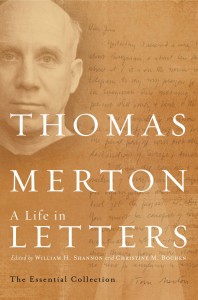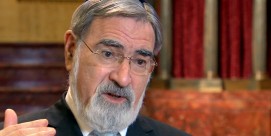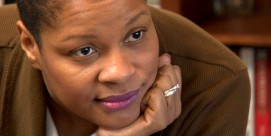In This Episode << SLIDE LEFT TO SEE ADDITIONAL SEGMENTS
Thomas Merton: A Life in Letters
Read excerpts from THOMAS MERTON: A LIFE IN LETTERS: The Essential Collection edited by Willam H. Shannon and Christian M. Bochen (HarperOne, 2008):
November 10, 1958
…It seems to me that, as a contemplative, I do not need to lock myself into solitude and lose all contact with the rest of the world; rather this poor world has a right to a place in my solitude….
December 22, 1961
…The question of peace is important, it seems to me, and so important that I do not believe anyone who takes his Christian faith seriously can afford to neglect it. I do not mean to say that you have to swim out to Polaris submarines carrying a banner between your teeth, but it is absolutely necessary to take a serious and articulate stand on the question of nuclear war. And I mean against nuclear war….
September 1962
…The illusion of America as the earthly paradise, in which everyone recovers original goodness: which becomes in fact a curious idea that prosperity itself justifies everything, is a sign of goodness, is a carte blanche to continue to be prosperous in any way feasible: and this leads to the horror that we now see: because we are prosperous, because we are successful, because we have all this amazing “know-how” (without real intelligence or moral wisdom, without even a really deep scientific spirit), we are entitled to defend ourselves by any means whatever, without any limitation, and all the more so because what we are defending is our illusion of innocence…
April 5, 1963
…It would seem that small contemplative communities are needed which, while preserving jealously their solitude and life of prayer, might also in discreet and limited ways offer opportunities for dialogue and spiritual communication with members of the surrounding society, particularly the intellectual and religious leaders, whether Christian or otherwise. There is a spiritual work of mercy which has almost become a corporal work in our time: offering to others some small share temporarily in the silence and solitude of a monastic setting.
May 7, 1963
…There is no question that the mystics are the ones who have kept Christianity going, if anyone has….
June 9, 1965
…The more I see of it, the more I realize the absolute primacy and necessity of silent, hidden, poor, apparently fruitless prayer….
September 28, 1965
…Did I tell you that I had moved out to the woods? I came out over a month ago. Go down only once a day, for Mass and dinner, then come back. I get a little supper for myself and as I don’t like to bother with cooking or washing dishes I try to keep it as simple as possible. It is really a wonderful life, a revelation, even much better than I expected. It is so good to get back to plain natural simplicity and the bare essentials, no monkeying around with artificialities and non-essentials. It really gives a wonderful new dimension to one’s life. I didn’t realize, until I got out here, how tense and frustrated I really was in community, though of course I love the monks….I like being a hermit, and I do have real solitude. There is never anyone around in the woods expect an occasional hunter, and we are trying to persuade them to go elsewhere. It is real solitude, and just perfect.
June 6, 1967
…as far as I am concerned the question “why do you have to be a monk?” is like a question “why do you have to live in Nebraska?” I don’t know. It’s what the karma added up to, I guess. Here I am, and it would not be physically easy for me to get somewhere else, but on the other hand I have what I want: a certain amount of distance, silence, perspective, meditation, room to do the things I know I must do. I would go nuts trying to do them in a city. Is this better? Certainly only for someone who knows he has to do it this way, more or less, or something like this. But not necessarily for anyone else. I am sure you are quite right about the ordinary life etc. This is a more ordinary life than you think, and also I wonder if I am more out of life or more in it? To me, the woods are life. Of course there is a lot wrong with it. Certainly it would be wonderful to have children to look after and as you say learn from. But I know for my own part that being married would be a very difficult proposition, much too complicated. Loneliness can be terrible too, but somehow I can handle that better. I’m only saying that is the kind of compromise with life that I have ended up with, and not making out it is wonderful: but it is what I can handle. More or less…
Midsummer 1968
…I am against war, against violence, against violent revolution, for peaceful settlement of differences, for nonviolent but nevertheless radical change. Change is needed, and violence will not really change anything: at most it will only transfer power from one set of bull-headed authorities to another….But the problems of man can never be solved by political means alone. Over and over again the Church has said that the forgetfulness of God and of prayer are at the root of our trouble. This has been reduced to a cliché. But it is nevertheless true. And I realize more and more that in my own vocation what matters is not comment, not statements of opinion, not judgments, but prayer. Let us pray for one another and try in everything to do what God asks of us.








